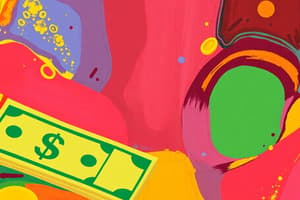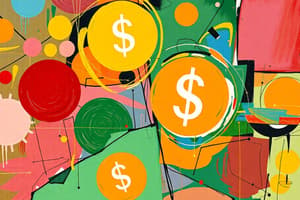Podcast
Questions and Answers
Which of the following best describes a 'money story'?
Which of the following best describes a 'money story'?
- A collection of facts about how to invest your money.
- A detailed financial record of all past transactions.
- The emotions, beliefs, and experiences that shape an individual's perspective on money. (correct)
- A fictional narrative used to teach children about finances.
What does the concept of 'trade-off' primarily involve in the context of financial decisions?
What does the concept of 'trade-off' primarily involve in the context of financial decisions?
- Investing in the stock market.
- Negotiating to get a better deal on a purchase.
- The act of balancing needs and wants with the available resources. (correct)
- Trading goods and services with others to save money.
According to the basic principle of demand, what is the expected effect of a decrease in the price of a good, assuming all other factors remain constant?
According to the basic principle of demand, what is the expected effect of a decrease in the price of a good, assuming all other factors remain constant?
- The demand for the good will decrease.
- The demand for the good will remain unchanged.
- The demand for the good will increase. (correct)
- The supply of the good will increase.
Which of the following best describes the term 'opportunity cost'?
Which of the following best describes the term 'opportunity cost'?
What does ‘Scarcity’ refer to within the field of economics?
What does ‘Scarcity’ refer to within the field of economics?
Which of the following is NOT typically considered sensitive information?
Which of the following is NOT typically considered sensitive information?
Which document is LEAST likely to contain sensitive information?
Which document is LEAST likely to contain sensitive information?
What is NOT a primary purpose of a Social Insurance Number (SIN)?
What is NOT a primary purpose of a Social Insurance Number (SIN)?
In the event of compromised sensitive information, what is typically the FIRST step one should take?
In the event of compromised sensitive information, what is typically the FIRST step one should take?
Which of these methods is LEAST effective for protecting sensitive information?
Which of these methods is LEAST effective for protecting sensitive information?
Which of the following is NOT a method of protection of digital sensitive information?
Which of the following is NOT a method of protection of digital sensitive information?
What is a key distinction between trust companies and banks?
What is a key distinction between trust companies and banks?
In which type of saving account would you find the ability to write checks or pay bills directly?
In which type of saving account would you find the ability to write checks or pay bills directly?
Which of the following is NOT a typical characteristic of predatory loans?
Which of the following is NOT a typical characteristic of predatory loans?
What is the primary purpose of a TD1 form?
What is the primary purpose of a TD1 form?
Which of these is NOT a benefit of filing an income tax return?
Which of these is NOT a benefit of filing an income tax return?
Which step in the tax filing process involves calculating your Net income?
Which step in the tax filing process involves calculating your Net income?
What is the relationship between net income and taxable income, as defined by the tax steps?
What is the relationship between net income and taxable income, as defined by the tax steps?
According to the information given, what are the 3 C's related to?
According to the information given, what are the 3 C's related to?
What is the typical purpose of a T4 slip?
What is the typical purpose of a T4 slip?
What is the main distinction between GST and PST?
What is the main distinction between GST and PST?
Which type of savings account typically requires the highest minimum balance?
Which type of savings account typically requires the highest minimum balance?
If a customer needs to deposit money for a fixed term, which type of account is most suitable?
If a customer needs to deposit money for a fixed term, which type of account is most suitable?
Which account type generally offers the highest potential interest rate?
Which account type generally offers the highest potential interest rate?
A customer wants an account with no minimum balance requirements. Which is the most suitable option?
A customer wants an account with no minimum balance requirements. Which is the most suitable option?
Which type of account might restrict the number of withdrawals you can make?
Which type of account might restrict the number of withdrawals you can make?
If a customer values the flexibility of accessing their money at any time, which is the least suitable account?
If a customer values the flexibility of accessing their money at any time, which is the least suitable account?
Which account type is LEAST likely to have a physical location?
Which account type is LEAST likely to have a physical location?
A customer wants an account that is typically linked to a checking account, and bond account, with limited withdrawals. Which of the following is most suitable?
A customer wants an account that is typically linked to a checking account, and bond account, with limited withdrawals. Which of the following is most suitable?
Which of these types of account is a timed deposit?
Which of these types of account is a timed deposit?
Which type of savings account allows the bank to lend the deposited money to other customers?
Which type of savings account allows the bank to lend the deposited money to other customers?
Which type of account always requires a minimum balance at all times?
Which type of account always requires a minimum balance at all times?
Which accounts offer similar ranges of interest rates?
Which accounts offer similar ranges of interest rates?
For which of the following accounts is there a requirement to keep the money in the account for a specific period?
For which of the following accounts is there a requirement to keep the money in the account for a specific period?
Which of these account types has no limitations on withdrawals?
Which of these account types has no limitations on withdrawals?
Which account type can be generally described to sit between regular savings and stock market like investments?
Which account type can be generally described to sit between regular savings and stock market like investments?
Flashcards
Money Story
Money Story
A story about how you learned and formed your beliefs about money. It's influenced by your family, culture, and experiences.
Economics
Economics
The study of how people make choices about using limited resources to satisfy their wants and needs.
Scarcity
Scarcity
The limited availability of a good or service. The more scarce something is, the more valuable it becomes.
Demand
Demand
Signup and view all the flashcards
Supply
Supply
Signup and view all the flashcards
Traditional Savings Account
Traditional Savings Account
Signup and view all the flashcards
Online Savings Account
Online Savings Account
Signup and view all the flashcards
Certificate of Deposit (CD)
Certificate of Deposit (CD)
Signup and view all the flashcards
Money Market Account
Money Market Account
Signup and view all the flashcards
Sensitive Information
Sensitive Information
Signup and view all the flashcards
Social Insurance Number (SIN)
Social Insurance Number (SIN)
Signup and view all the flashcards
Documents containing Sensitive Information
Documents containing Sensitive Information
Signup and view all the flashcards
Information Compromise Response Plan
Information Compromise Response Plan
Signup and view all the flashcards
Financial Institutions
Financial Institutions
Signup and view all the flashcards
Banks
Banks
Signup and view all the flashcards
Trust Companies
Trust Companies
Signup and view all the flashcards
Savings Account
Savings Account
Signup and view all the flashcards
Scams
Scams
Signup and view all the flashcards
Income
Income
Signup and view all the flashcards
Income Tax
Income Tax
Signup and view all the flashcards
Tax Brackets
Tax Brackets
Signup and view all the flashcards
Social Programs
Social Programs
Signup and view all the flashcards
T4 slip
T4 slip
Signup and view all the flashcards
TD1 Form
TD1 Form
Signup and view all the flashcards
Tax Return
Tax Return
Signup and view all the flashcards
Tax Filing Deadline
Tax Filing Deadline
Signup and view all the flashcards
Study Notes
Unit 1
- Financial literacy is crucial for developing healthy relationship with money
- Start small, one step at a time in learning about personal finance
- Talk to friends, build healthy relationships with money.
- Be honest about your financial situation, set goals and find like-minded people
- Understanding that being rich is not equivalent to being smart
- Prepare for potential negative feedback
- Find a mentor who understands money management.
- Listen more than you speak, consume more financial content, and join a group to improve financial literacy.
- Money stories shape how we view and manage money, including impactful experiences
- As children, we imitate behaviors, listen to advice, and acquire experiences that impact how we view and manage money, and absorb emotions about money from the parents.
Needs Vs Wants
- Trade-offs occur when you need to choose between needs and wants based on available resources
- Needs are essentials for survival, while wants are non-essential desires.
Economic Systems
- Economics studies production, consumption, wealth transfer and currency
- Scarcity arises from limited resources and limited supply
- Demand represents the desire for goods and services at different price points.
- Supply mirrors the quantity of goods or services offered.
- Traditional, market, command and mixed systems
- Understanding the concept of opportunity cost, complementary and substitutes for products and services
Unit 2 (Sensitive Information)
- Sensitive information includes personal identification numbers, medical information, financial information, and login credentials
- Sensitive information should be carefully protected
- Financial documents, identification documents, educational documents, and legal documents
What to do when sensitive information compromised
- Secure the information by changing passwords and enabling two-factor authentication
- Notify affected parties, such as banks, and monitor for fraud
- Report the incidence of breach to authorities, and take steps to protect yourself from identity theft by creating fraud alerts on your accounts.
- Use security software, learn about types of scams, and consult with experts for recovery and legal advice.
Methods of Storage and Protection
- Provide safe physical storage, such as safes and deposit boxes
- Create encrypted digital files and folders to protect your digital information.
Unit 3 (Types of Financial Institutions)
- Deposit-taking institutions (banks, credit unions, trust companies) act as intermediaries
- They accept deposits, make loans to clients, and manage funds
- Insurance companies protect individuals and businesses from losses
- Investment institutions manage funds on behalf of others.
Trust Companies, Banks and credit unions
- Trust companies provide various banking services, administering estates and trusts.
- Banks offer full commercial lending powers independently of a trust company
- Credit unions are member-owned, non-profit cooperatives, offering financial services at lower costs for their members
Indigenous Financial Institutions
- Indigenous financial organizations serve Indigenous communities
- They provide various financial services such as loans for business development
Types of Saving Accounts
- Traditional savings accounts, online saving accounts, and certificate of deposits offer different interest rates and minimum balance requirements.
- Money market accounts offer higher interest rates than traditional accounts.
Predatory Loans
- Payday loans and car title loans are short-term loans that have a high annual percentage rate, and there are significant risks associated with them
Unit 4 (Definitions)
- Mortgages, Principal, Collateral, Grace Period, Down Payment, Consolidation Loan, Billing Cycle and Co-Signer are key terms
Credit and Lending
- Lenders extend credit, and borrowers repay, often with interest for the use of money.
- Secured loans use collateral for security, while unsecured loans do not.
- Foreign transaction fees, prime rate, term, variable rate, interest, credit limit, balance, debt, and minimum payments are key terms
Unit 5 (Income Tax)
- Income tax is a tax on a person's income.
- There are federal and provincial income taxes, applicable locally
- Methods of filing, identification and other important info
- Different types of tax filing options are electronic and traditional methods
Studying That Suits You
Use AI to generate personalized quizzes and flashcards to suit your learning preferences.




